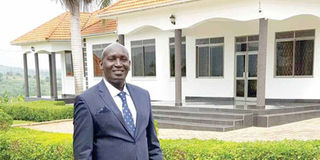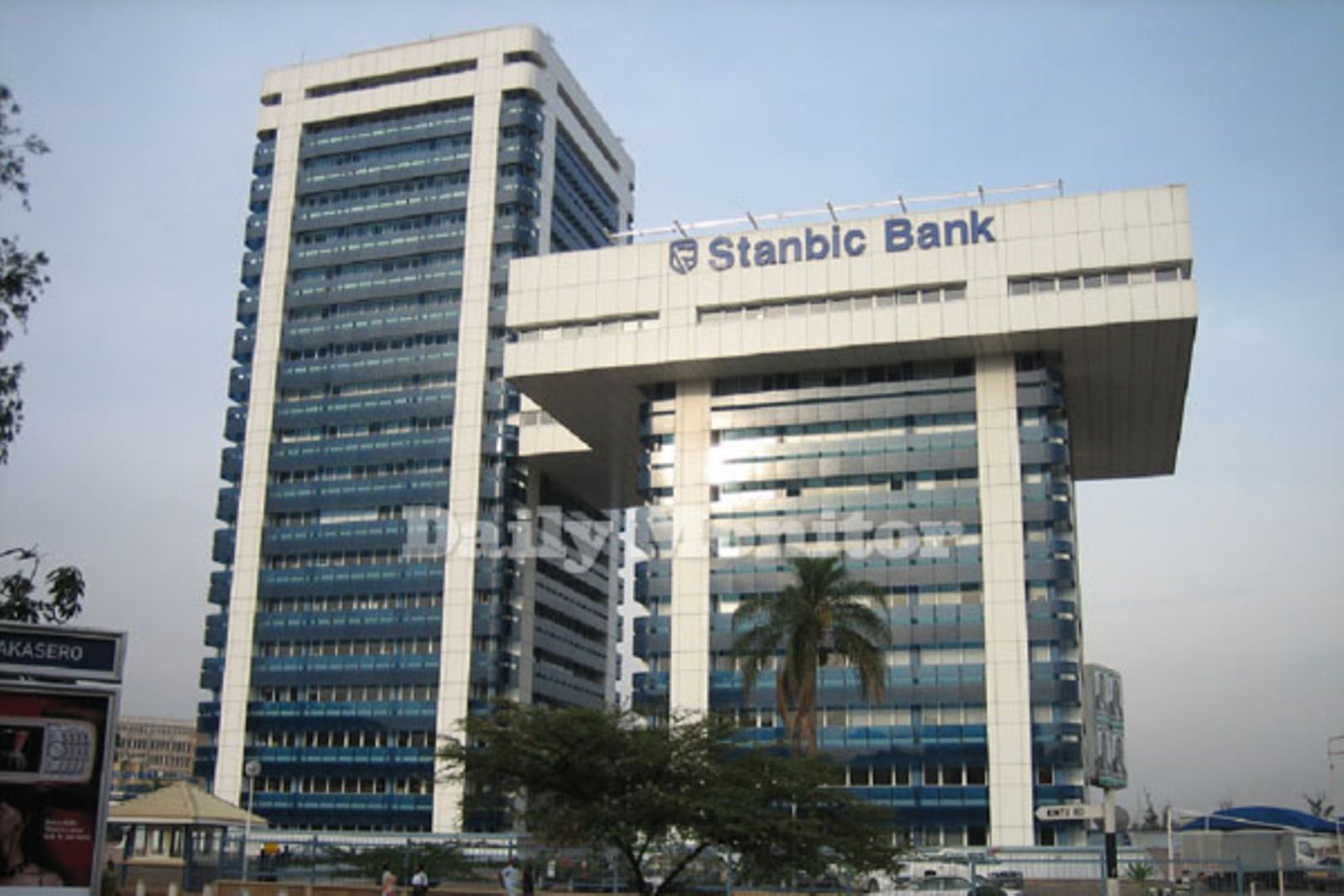Prime
Mugarura turned his three bedroom house into hotel

Investor. Benon Mugarura has transformed a three-bed roomed house into a two-star hotel. PHOTO BY BRIAN MUGYENYI
What you need to know:
- Managing. “Managing the hotel is one of those jobs I relish most. Even our clients here motivate us to raise standards and provide them with what they want,” says Kellen the wife to Benon Mugarura, she is the hotel manager.
- She adds, “Hotel business needs commitment and first class customer care. We receive a number of people here, but if we had no decent care, customers would have shunned the place. So, we aim to serve everyone like a king.”
Black and white, the prominent colours you will see on the three floors of the hotel explains its name- Zebra hotel.
Situated along Baine Terrace road, Kizungu, Masaka District, this haven for tourists started as a residential house for Benon Mugarura. Now a 134 roomed hotel, its surroundings spot lush trees and flowers.
The 52-year-old founder and chief executive officer (CEO) of the hotel strikes as humble figure when we first meet.
“Oh I am really sorry for delaying you,” he apologises for being an hour and a half late for our interview, as he alights from his car.
Born to late Nathan Rwaheru and Freda Kyabaishiki residents from Kebisoni village, Rukungiri District, Mugarura says he is proud to be a businessman.
He is involved in hotel management, road construction, farming and baking.
Starting
A strong believer in self-employment, in 2001, he took the risk of turning his family home into a guest house. He had bought the one-acre property at Shs48m in 1990 from the government, paying for it in instalments.
“It was situated in a prime area that had started attracting foreigners who demanded housing and other relaxing places which were few in Masaka then,” he says.
The property had three bedrooms, a sitting room and the garage where he and the wife first moved as they planned the guest house. They moved the rest of the family to Kinuka village.
The sitting room was transformed into a restaurant, the bedrooms turned out as lodging rooms and the garage was later made a bar.
They started with only five staff who helped provide services: foods and beverages. Each room was charged Shs50,000.
Expansion
They soon got overwhelmed by customers and in order to match up the demand, he used his savings and also sold cows from his farm in Lyantonde so he could expand his business. It became a 24 bedroomed lodging house in 2004.
Currently single rooms cost Shs50, 000, executive Shs100,000 and VIP rooms cost Shs500,000. Food prices range from Shs20,000 to Shs35,000 a plate.
“The daily customers back then were my friends, workmates and people from Masaka. However today the town attracts a number of immigrants especially whites,” says Mugarura.
Soon there was need for conference facilities thus he had to buy more land expand further.
Today the hotel has 134 bedrooms, with a well-equipped health club and three huge conference rooms accommodating over 500 people.
On average, he receives more than 50 guests per day who access different services.
Industrial training
The hotel also offers free seasonal trainings to catering students and more than 1000 students majoring catering have attained hands-on training.
Currently, they have been helping students in institutions such as; Makerere University Business School, Mutesa I Royal University and other surrounding institutes.
Challenges
However, not all is rosy to Mugarura’s side. One of the many challenges he is facing is the increasing payments of electricity bills.
This is also followed by exorbitant water bills and taxes but he says, the money he collects from customers more a times help him pay back the charges.
The competition is also stiff, as he is not the only businessman in the hotel business in Masaka but because of good and health services he offers, he says he has a lot of dependable customers who believe in him.
With the increasing level of technology, at times he is forced to go abroad and source out other commodities and technics that would attract the customers.
Advice
As a way of surviving in hotel business, Mugarura advices that those interested in investing in this business, should know that fetching immediate profits is not a guarantee but with commitment, consistence and patience the business is likely to prosper.
However, Mugarura, also the Chairman China-Africa Friendship Association Uganda (CAFAU) founded in 2012 to promote business, and trade between Africans and Chinese, says, he is also mandated to ensure that there is an increase in balance of trade between China and Uganda as well as technological and scientific transfer from China to Uganda and cultural exchanges to contribute to Uganda’s development.
Other businesses
Mugarura, is also the proprietor of Assured Engineering Company dealing in road construction whose main offices are situated in Kampala, Bugoloobi road.
He says the money he gets out from constructing roads has helped him increase on his earnings as well as getting more add up capital to invest in the hotel which he refers to as the grandfather of his businesses.
“With road construction, as a contractor, you invest in the money and later get paid by the government when the construction is done. I normally get money from the bank. Take for example when I am to construct a gravel road averagely cost between Shs4m to 50m depending on the standard, so I have to be with that money by myself,” he says.
“When the money is delayed by the government, then my profit is likely to dwindle because the bank would increase the interest rates, so this job also calls for ready money. Average cost of tarmacking a one kilometre road ranges from 1bn to 5bn,” he added.
The road company employs 70 people directly and they have constructed many tarmac and gravel roads as well as training young engineers in the country.
As an engineering company, they have been able to support fuel dealers, and those dealing in spare parts and those making road culverts within Masaka and beyond.
Many a times road users complain over sub-standard constructed roads, and being an engineer with the construction expertise, Mugarura is befitting to offer answers for this question. Why construct poor roads?
“Sometimes people who contracted with these jobs are less competent. Because they have money and machines to execute their duties, the government ends up by falling in their trap, and at end of the day, when the roads are poorly constructed the public blames this to all engineers,” he explained.
However, Mugarura believes there are so many other factors that could bring about poorly constructed roads.
He says; although the policies guiding them are there, some companies deliberately do not employ competent technical personnel to manage construction works.
Then cash flow must be maintained by not delaying payments and this normally affects even contractors with competence mentioned above according to him.
“We are facing a problem of underpricing. Some contractors are desperate to get work, they end up asking for even little money which could not help finance the entire project and hence ending up constructing poor roads,” he noted.
PROFITS
Focus. Mugarura reveals that although he cannot share a particular profit figure, the profits are substantial.
He is however weighed down by bills such as electricity and water and some taxes to a rough estimate of Shs10m per month.
“My passion is to create as many jobs as I can here, and promoting tourism from within and outside,” he emphasised.
Others say
“Mugarura is very cooperative man who gives traders and hotel owners knowledge. He spent most of his early days in Kampala which could force him to construct such a hotel there but he decided to construct it in Masaka. As a hotel, they are promoters of Agricultural sector because most of the goods they use are agricultural. They are our investors. For Masaka that is looking after a city status, the hotel has created a natural beauty here which attracts tourists hence promoting the tourism industry. The hotel helps us especially when it comes to holding meetings, workshops and many other things and at negotiable prices,” says Godfrey Kayemba, Mayor Masaka Municipality.




